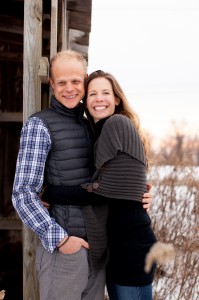Interview with Goodwin Prize Winner Nathan Walton
The title of your paper: Freedom From or Freedom For?: The Prosperity Gospel, Dietrich Bonhoeffer, and Social Responsibility
What inspired you to pursue an advanced degree in theology? What do you hope to do with your degree?
I was inspired to pursue an advanced degree in theology because of my interest in the relationship between academic theological discourse and church communities. I hope that my degree will further equip me to teach theology in both academic and ecclesial settings.
Where do you see connections between your personal faith, your intellectual work and the other aspects of your life?
While serving as Community Life Pastor of Charlottesville Vineyard Church, I have had opportunities to integrate ideas and concepts from my theological studies into sermons, formation courses, and various aspects of liturgy. Conversely, my involvement in the church has shaped my academic interests by helping me to be accountable to a concrete community.
How would you summarize your paper for someone without a theological background?
My paper draws from Dietrich Bonhoeffer’s views on the Christian life to critique how the Prosperity Gospel Movement responds to socioeconomic inequality. I argue that the Prosperity Gospel emphasizes an individualistic view of socioeconomic progress that does not effectively address wealth disparities, whereas Bonhoeffer provides a better theological framework for socioeconomic equality and interdependence.
How might this award make a difference in your life?
I recently have begun ethnographic work for my dissertation, which involves research at two churches in Richmond, Virginia. This award will help mitigate research expenses as I travel back and forth to Richmond to conduct fieldwork.
What would you say to prospective donors might fund the Goodwin Writing Prize?
The Goodwin Writing Prize plays a unique role in cultivating scholarship among aspiring academics that is both theologically innovative and deeply practical for the church. Through their financial support, those who fund the Goodwin Writing Prize help to mitigate the frequent chasm between the church and the academy, while promoting theological discourse that is beneficial to both communities.
How do you spend your time when you are not studying?
When I am not studying I spend a lot of my time serving as the Community Life Pastor of Charlottesville Vineyard Church. For fun, I enjoy weight training, playing basketball, and playing the saxophone. I also am quite prone to spontaneous Netflix and Hulu binges.
Any other comments?
I am deeply grateful for the Goodwin Writing Prize and the generosity of the Board of Directors of Theological Horizons. The Goodwin Prizes promote the type of creative, sophisticated, and practical theological reflection that is most needed today.
Reflections on the CCDA Conference | Abby Deatherage 16
It was a glaringly bright Friday afternoon in Memphis, Tennessee, and all of a sudden, the world had gone silent. We were standing in front of the Lorraine Motel: the motel where Martin Luther King, Jr. was assassinated in 1968. In fact, we were standing directly under the room where he had been killed, a single wreath marking the balcony. As we stood in the sunshine, squinting up at room 306, I felt overwhelmed by a deep sense of injustice and tragedy at the loss of a man who was the figurehead and orator for issues we still wrestle with today.
We continued through the Lorraine into what has now become the National Civil Rights Museum, taking a journey through the dawn of slavery and ending, after a long and winding walk, in the room where Martin Luther King, Jr. spent his final hours. We listened to his last speech, given just a few hours before he was killed:
“I have seen the Promised Land. I may not get there with you, but I want you to know tonight, that we as a people will get to the Promised Land! I’m not fearing any man…Mine eyes have seen the glory of the coming of the Lord!”
What tragedy and yet, what hope and joy exist just in that kernel! There is no doubt in my mind that King knew he was going to die that day.
To me, the great sadness of knowing what happened and the great hope of the coming kingdom exist in tension there–and it’s a tension I found almost hourly during my time in Memphis. I and four UVa friends were attending the annual conference for the Christian Community Development Association (CCDA). As we attended sessions and took notes and listened to incredible people, our hearts were broken over and over and over again.
For the injustices done to the American Indian population. For the students labeled in third grade as unsuccessful and expected to be incarcerated by the time they graduate. For the people in Israel/Palestine, living in fear and hoping for peace. For our nation’s broken immigration system, and the immigrants who are treated as subhuman commodities in this country. For the outrageous greed and racism in mass incarceration. For the structural racism and white supremacy built into this country’s constitution.
And, in a moment no one was expecting, for the people of Paris, the people of Beiruit, the students in Nairobi.
We cried, we prayed, we sang songs of lamentation. We allowed our hearts to be broken, over and over again.
And yet, we did not hesitate to celebrate the work that is being done. We celebrated teachers who are loving the children of the inner city, principals who care deeply about giving their students holistic education and care, organizations that care for immigrants and advocate for them in the court system. We learned tools for engaging our own communities on the topics of mass incarceration, American Indian injustices, immigration. We met people who are passionate and driven. And we found time for fun–trips to Beale Street, walking through Memphis, late-night drives across state borders.
I’m thankful for the encouragement of people who think deeply, who allow their own hearts to be broken, and who act. I’m thankful for the glimpse of the Kingdom I was afforded; a brief glimpse into a Kingdom I want to be a part of.
Reposted with permission from: https://abbydeatherage.wordpress.com/2015/11/23/broken-hearts/
2015 Goodwin Prize winner Jaesung Ryu Interview
The title of your paper: Trauma and a Theology of Holy Saturday: Remembering and Mourning with WWII Comfort Women
What inspired you to pursue an advanced degree in theology? What do you hope to do with your degree?
I was raised with very conservative Christian values. However, most of my teens was spent outside of church, where my social life revolved around a large university town in the 1990s—a space of public demonstration that calls for full liberation and social justice of South Korea. Ironically, this provided a strong sense of belonging, and at the same time instilled caution about the system that is unjustly institutionalized in Korean society. I was consciously and unconsciously taught about “social justice,” and deeply engaged in my growing interests in the social and even religious structures of oppression underneath, all around and across society.
Little by little, the very conservative church community that had felt safe and nurturing as a child started to feel like a “circled wagon” toward an open and very precocious, rather than troublesome, teenager I was growing into. I internalized the conflict between my conservative church community and my emerging liberal identity, which left me feeling out of place. I retreated, and I never talked about my feelings for fear of greater judgment and potential ostracization. I felt alone and lonely. For a long time, I was in constant prayer with God, straining to believe that this loneliness was not what God intended for me.
In university, I found some relief from the stifling pressure I was feeling in my conservative church, and I enjoyed being immersed in a different culture where there was more room to be myself. I majored in English Language and Literature and equipped myself with literary studies about Black Liberation, Native American, Feminism, and various subjects of legal, economic, and political rights in the mid-nineteenth to late twentieth century of America. Ultimately, I realized that my heart for social justice was not a coincidence but had been formed by God since my teenage self constantly prayed to God with his internal conflicts with conservative Christian values. After years of my undergraduate works, I started working with NGO and at-risk and homeless populations, which eventually led me to pursue seminary and ordained ministry.
Seminary was transformational. It was a huge demand on my time, energy, and relationships. I had to learn new ways of balance and self-discipline. I had to encounter my ego time and again, and the frustration of not knowing it all. I also had to be intentional about rigorous training in both philosophical analysis and theological interpretation. Overall, my education was affirming. I held my own views of social justice academically and earned the respect of my professors and colleagues. In turn, I was strongly encouraged by the leadership and faculty of the Seoul Theological University to expand my academic work of social justice in theological studies at Candler School of Theology.
As a student of MTS program at the Candler School of Theology at Emory University, I took advantage of all the opportunities and programs developed to help me achieve academically and grow spiritually. I was also encouraged to worship regularly and engaged in community with my fellow students who came from all walks of life, with different professional and academic experiences. Overall, my education was formative.
There were three MTS classes at Candler School of Theology significantly formative: Black Theology and Ethics (Dr. Noel Leo Erskine), Christianity and Holocaust (Dr. Timothy P. Jackson), and Redeeming Memories: Cultural Memory, Christian Witness, and Social Genocide (Dr. Nichole R. Phillips). As part of my spiritual growth and academic development at the intersection of theology and social justice, I had to encounter the phenomenological contexts of today's persecuted world time and again, and a number of previously silenced and submerged subalterns’ voices.
Especially as I listened to many voices of those who survive the Holocaust and other forms of violence, including racism, sexism, homophobia, xenophobia, and terrible genocide, I could not help but take issue with most theological discourse to date, which has gone without addressing the question of suffering that remains (i.e., trauma); without rendering moral discourses and practices towards demanding justice for survivors of traumatic events. Ultimately, I was led to carry out independent research and analysis about WWII comfort women (Japanese military’s sex slaves) and learned how to see the world through the reflective, constructive lens of Holy Saturday, manifested in Hans Urs von Balthasar’s classic texts Mysterium Paschale, Explorations in Theology volume 4, and Theo-Drama volume 4 and 5, as well as David Lauber’s close reading and critical analysis of Karl Barth’s treatment of the descent into hell and its relation to his theology of the Atonement (David Lauber, 2004). At the heart of this reflective, constructive lens of Holy Saturday is the twofold picture of Holy Saturday: suffering remains, but love remains more—even at the place at which the channels of graceful future and hopeful healing are most threatened.
If I am given an opportunity to do a PhD program in theological studies with special attention to Holy Saturday, I will bring to PhD program my desire to lift up the need for an interdisciplinary approach and examining untapped theological resources for a constructive practical theology of trauma. Ultimately, I will create more space within the field of theology to speak about the role of God in providing hope and redemption for the traumatized.
Where do you see connections between your personal faith, your intellectual work and the other aspects of your life?
I have a lovely wife. I love her, and she taught me a sense of hope; hope is pure; hope is beautiful; hope is innocent; hope is a touching eulogy of life. In hope, all of my life seemed going to be well. Thus, the comedy of hope slowly yet compactly encroached on my personal faith. However, this fairy tale failed to expand its territory on my personal faith when a tragedy came to my wife.
It was during my formative time at Candler School of Theology my wife suffered the horrible side-effects of antibiotics. She missed a proper, immediate health care due to unaffordable costs. In fact, the health insurance plan we had in the states was only able to cover one-sixth of costs. Additionally, she had to go through needless suffering due to misdiagnosis and faulty medical practices. In turn, her condition became serious. Further, it became almost irrevocable on our long way to Korea for medical treatment. This long, traumatic journey to Korea left inexpugnable wounds on her body and internal organs as well as my trust in hope and the medical profession. This wounding of naivete and trust went deep and begged the question of “why?” in a way that any suffering, but especially undeserved or what is often called as “unmerited” suffering, raises fundamental questions about life, meaning, and hope.
Why was there such suffering? Hope should never fail, but it no longer plays in my life as a pure comedy because her body will not relinquish but hold the “inexpugnable” wound that shows that the stories of healing and transformation most often told in our lives by Christian traditions do not guarantee a comedic “Hollywood ending.” Ever since that day, I’ve been less quick to read hope and redemption in a linear fashion in which life is victorious over-and-against death.
Then, how do I maintain a vision of hope and redemption without a prior assumption that the vision will be necessarily realized in the present? How do I live for the ministry without guarantees of success or progress? What would be my view of healing and transformation if I pay attention to the “inexpugnable” wounds? My personal story raises heavy questions, pose a significant challenge to my intellectual work, and ultimately require me of finding different answers in responding to the question of a suffering that does not stay in the past but invades the present and offers an antithesis to a familiar saying: time heals all wounds. To be honest, there’s no fixed answer to this question, only the assurance that my passion and research in my intellectual work will raise to the surface the significance of a suffering that is not over yet and how one finds hope and redemption in the midst of that suffering.
How would you summarize your paper for someone without a theological background?
What is hope? How is one able to develop his or her capacity to hope? Projecting oneself into the future dimension by developing one’s trusting anticipation of the future is a natural process, but what gives hopeful content and tone to his or her trusting anticipation of the future?
Development of anticipatory consciousness comes early in life. We are very young when we begin looking into an open-ended future through considering possibilities. We fill this future dimension with content based on previous experience but creatively enhanced and formed by our basic assumptions about the world: the world is benevolent and embraces a meaningful and coherent whole and not a basket of uncertainties. Our basic assumptions are the foundations for our anticipations of the future and, therefore, our hope.
In the case of traumatization, however, all these basic assumptions are completely shattered. We lose the foundations for our hope. Thus, we can commonly find a sense of stress and despair in traumatized people. Trauma damages their sense of hope. Intensive anxieties such as feelings of shame, fear of judgment, and extreme vulnerability continue to haunt their lives and capacities to hope. Trusting anticipation of the future cannot easily be reestablished. That is understandable because the traumatized often fail to embrace the mystery and excitement of open-ended future and the not-yet.
Maybe, we need time and patience. Given the profound losses and the ongoing effects of trauma that the traumatized have suffered, it is obvious that one must be patient and wait until the traumatized are ready to be healed. The rush to move forward does nothing to bring hope. Rebuilding the basic assumptions that serve as the basis of our hope is a slow and repetitive task. In this sense, trauma scholars and specialists are always told of deliberately slowing down the process, patiently enduring its slowness, and always waiting the survivor’s autonomous or voluntary participation, while remembering the maxim that “the slower you go, the faster you get there.”
Where can we find such an “enduring” or “waiting” community, instead of one that is “demanding” or “pushing” for immediate healing? In the twofold picture of Holy Saturday that I have described in the essay Trauma and a Theology of Holy Saturday: Remembering and Mourning with WWII Comfort Women, one may see the “enduring” or “waiting” community is eventualized through the Son who patiently endures what persists between Good Friday and Easter Sunday. Instead of rushing to the hopeful promise of all shall be well, the Son of God empties himself to fully embrace authentic elements of human physical and spiritual death and enables the dead, the forsaken, the hopeless to have communion with the one who is intrinsically love. While this “enduring” or “waiting” relationship needs further development, the scholarship and cooperation of contemporary theologians and trauma theorists demonstrates its theoretical feasibility and practical usefulness. A helpful example supporting its value but needs further study and development is also given by the essay I have written with the title Trauma and a Theology of Holy Saturday: the Comfort Station Survivor’s Wednesday Protests in South Korea.
How might this award make a difference in your life?
I am pleased and truly blessed to be the 2015 recipient of the Goodwin Prize award. It has further encouraged me to continue to live out the core values of Holy Saturday theology and to integrate them to my professional practice as an articulate, informed, research-minded theologian with a practical-theoretical focus. Winning this Goodwin Prize award will alleviate some of the financial burden that my ongoing studies have placed on my family, allowing me to concentrate on my academic goals of developing my career to new heights and lifting up the need for an interdisciplinary approach and examining untapped theological resources for a constructive practical theology of trauma. Thank you to the board of directors of Theological Horizons for recognizing my dedication to consciously live out the core values of Holy Saturday theology in my life. I am looking forward to the opportunities that the Theological Horizons has opened up for me and the ways that I can begin to contribute back to the community.
What would you say to prospective donors might fund the Goodwin Writing Prize?
It is amazing to see how many prospective donors have contributed to the Goodwin Writing Prize. With so many deserving candidates, I am truly honored to receive the Goodwin Writing Prize, and am pleased to represent the Candler School of Theology in Emory University. This prize not only reflects my personal commitment to the community of faith, but also the support of my family and academic mentors. As such, it will continue to represent a big help in reaching the core values of Theological Horizons and bring in the near future so much joy and meaningful supports to many other young scholars of promise and commitment. I have no doubt that a financial gift from you has allowed many seminarians to progress further in continuing to achieve greater heights in their academic studies and future work careers. Your gift will feed them for a reasonable length of time and allow them to transform lives and build brighter futures in the field of theology as well as the church and our larger society. Thank you so much for your support!
How do you spend your time when you are not studying?
I am a young parent struggling with the challenges of raising a young toddler and juggling my marriage as well as career. If I do have an opportunity to spend my time when I am not studying, I have no choice but temporarily care my daughter and my pregnant wife at home. I usually start my early day to the sound of a toddler belting out “Mommy! Daddy!” while impatiently rattling the bars of her crib. My daughter usually wakes up at 5:00 AM, crying loudly for fruit pouches, honey almond cereals, and her favorite Organic, Vitamin D included milks, which I am not allowed to drink: “It’s only for my daughter,” my wife said. Before I can clear my sleep-bleary eyes, I am tripping over toys and getting her pouches, cereals, and milks. I am lucky if I get a shower before I go to work or school. It is almost impossible for me to spend a quiet, meaningful hour in prayer and Bible study.
Certainly, my life is jam packed with things about family, hospital, church, and school. Spending spiritual time with God in this context may not always look the way I believe it should, but it can happen. So I have to find a way that enables me to continue my spiritual journey with God when I am not studying. I hope that even small chunks of time with the Lord here and there can add up to meaningful spiritual growth.
Any other comments?
I am a 32 year old Korean Christian pastor, married, and expecting my second child in the next couple months. I graduated from the Candler School of Theology at Emory University with a MTS in May 2015. I completed one unit of ACPE CPE and was accepted into the Emory University Hospital Spiritual Health Residency Program July 2015-July 2016. I was ordained at the end of April, 2015 in my denomination Korean Evangelical Holiness Church (KEHC)—which has two particular features: the England Puritan tradition in terms of advocating greater purity of worship (ritual) and the Wesleyan-Holiness evangelical tradition that explores how to address contemporary social issues and appears winsome to a post-modern world; and served until recently as an associate pastor at a local Korean American Church, the Servant Korean Evangelical Church of Atlanta.
For more information on the Goodwin Prize, click here.
Announcing the 2015 Goodwin Prizes for Excellence in Theological Writing
The board of directors of Theological Horizons is pleased to announce the winners of the 2015 Richard & Louise Goodwin Prizes. Awards are given to graduate students whose essays demonstrate creative theological thinking, excellence in scholarship, faithful witness to the Christian tradition, and engagement with the community of faith.
The $2,500 prize has been awarded to Jaesung Ryu of Emory University for his essay, “Trauma and a Theology of Holy Saturday: Remembering and Mourning with WWII Comfort Women.”
The $1,000 prize has been awarded to Nathan Walton of the University of Virginia for his essay, “Freedom From or Freedom For?: The Prosperity Gospel, Dietrich Bonhoeffer, and Social Responsibility.”
Brad East of Yale University has been awarded $500 for his essay, “Patiently Awaiting the Death and Resurrection of the Universe: Eschatological Memory and Ecological Ethics.”
Honorable mention awards of $250 go to Lisa Hickman (Duquesne University) for “Before Our Bodies Glittered: Beyond Ontological Difference in Disability and Theology,” and David Berka (Duke Divinity School) for “Home of the Dispossessed: Augustine, Wittgenstein, and Truth Telling as Confessional Grammar.”
Abstracts of the winning essays and interview with the writers will be posted at www.theologicalhorizons.org soon. We are deeply encouraged to see young scholars of such promise and commitment and weoffer our warm congratulations to all how participated in this year’s competition.
Thoughts on Vocation | Meredith Berger '16
Meredith Berger and her puppy, Callie.
Fourth year is a time of joy and celebration, for soon we will receive our degrees and find our greater purpose and role in society. This year will be spent enjoying our youth, making lasting memories and finishing strong academically. We have made it this far, and the goal is to make this year better than the previous three. While there is nothing wrong with doing any of the aforementioned, there are important lessons to remember before setting our expectations high.
I’ve heard more Fourth years than not complaining about case interviews, salary negotiations and relocation. The stress of job applications, interviews and the terrifying abyss we call “the future” weighs heavily on us, and we lose sight of what gives us joy. We base our vocation on what we believe we should do, not on what we are called to do. This constant planning gives us little time to live in the present, and as we continue to have our heads in the future, we miss opportunities to be happy now. Finding our niche is important and we will all eventually determine where our joy meets the greatest hungers of the world, but we can’t all force ourselves to discover it right now. The pressure we put on ourselves can muffle God’s voice and dim the joy from our hearts. It is important to remember that Fourth year is a great year and worthy of celebration, but it is by no means when we figure everything out.
It’s also important to remember that Fourth year is not the peak of ours lives. The pressure we put on ourselves to make Fourth year the “best year yet” or to make our last year of college “the best of our lives” is a standard that should be avoided. We do not need to have made our mark or made a difference by our Fourthyear. We do not have to feel like we have it all figured out and that we need to have an excessive amount of fun, because everyone tells us this is IT. This is a beginning, not an end, which is why we call it “fourth year” and not “senior year”. Our education never ceases, and neither do our experiences. We are in one season of our lives and have so much more time to find out where our calling is. Just listen and pray, and lose the anxiety of making this the best year of your life, because as long as you have joy and know God’s love, you will find your purpose.
Wondermentality Summer Study: faith, art & poetry
JOIN US!
WONDERMENTALITY SUMMER STUDY: reflections on faith art and poetry
Explore the beauty of God this summer! We will reflect upon the subtle yet surprising ways God teaches us to see anew through the arts.
With readings from Mark Jarman, Dana Gioia, Li-Young Lee, Denise Levertov, David Kirby, Emily Dickinson, Flannery O'Connor, Edna St. Vincent Millay, John Donne, Richard Wilbur, Gerard Manley Hopkins and Emily Brunner.
Led by William Boyce, doctoral student in religious studies at UVa. Hosted by Westminster Presbyterian Church.
Sunday evenings from 8-9 pm at Common Grounds (corner of Rugby Rd & Gordon Ave., one block from Beta Bridge). ALL ARE WELCOME. No advance preparation is necessary.
One more left! July 26
Would you like to receive the poems and readings? Just email us and we'll send you pdfs of everything! info@theologicalhorizons.org
Reflections on the Wondermentality Study by William Boyce:
“The quest of beauty reminds us of our final destiny, it sets us back on our path, [and] fills us with new hope.” (Pope Benedict XVI to a gathering of artists at the Sistine Chapel.) As Christians, we need more than rigorous teaching and sound philosophy--but our teaching and understanding must always be a witness to the beauty of God and His creation. The Good. The True. And the Beautiful. Together, these transcendentals help us to understand the scope of Christ’s cosmic declaration as “the Way, the Truth, and the Life” (Jn 14:6). We should hardly be surprised to discover, then, an enduring admiration for authors like C.S. Lewis, J.R.R. Tolkien, Flannery O’Connor, Marilynne Robinson, John Updike, and Fyodor Dostoevsky—to name a few—who blend these elements in powerful yet sublime ways.
This summer, Theological Horizons has welcomed students and members of the community to join our quest of beauty, or what we called, “Wondermentality.” By partnering with Westminster Presbyterian Church, we have been able to host intimate conversations in a “coffee-shop-esque” setting on matters of faith, art, and wonder.
As a six-week series, without any prerequisites or preparations required, we reflect each Sunday through artistic works on the “big” questions of doubt, desire, hope, discouragement, friendship, apathy, longing, joy, and purpose. We have discussed theologians (Emil Brunner, Martin Luther, Dietrich Bonhoeffer), novelists (Flannery O’Connor, Ernest Hemingway), poets (John Donne, Gerard Manley Hopkins, Emily Dickinson, Mark Jarman, Li-Young Lee, and Denise Levertov), and everything in between, from playwrights and painters to stained-glass artists and architects.
Good art leads us to ask important questions, and while it is by no means the preserve of Christianity, it is something Christianity cares about deeply. If Emil Brunner is right that “Art is always the child of the longing for something else,” then art is a kind of redemption that points to the ultimate redemption of God in Christ.
Although the summer is a challenging time for campus ministries, we have had tremendous enthusiasm for this series on the arts—with a few students attending who have no or loose religious affiliation. We have had UVA professors, local teachers, recent alumni, and whole families participate. Some conversations have lasted well past the end of our formal discussion and into the late evening.
In all, “Wondermentality” has been an exciting opportunity to consider what T.S. Eliot regarded as the “intersection of the timeless/With time.” Your faithfulness in prayer and your contributions of all kinds to Theological Horizons have made this summer a fruitful time of ministry. Without your continued support, we certainly would not have seen so many wonderful conversations started, connections made, big questions pondered, or wounds redressed. In the words of Paul, thank you for being “co-workers in God’s service” (1 Corin. 3:9).
Kindly,
William P. Boyce
A Graduation Speech
An address given to the class of 2015 of the Covenant School of Charlottesville by Karen Wright Marsh, Executive Director of Theological Horizons. May 30, 2015 Good morning, friends: families, faculty and administration—and a very good morning to you, Covenant School Class of 2015! It is a tremendous honor to be with you on this happy occasion and to be a part of the Covenant community for a day I’ll always remember.
Graduates, while you labored over your senior theses this spring—and I know they all turned out to be brilliant papers—I had a research project of my very own. Ever since Mr. Sanker invited me to speak back in the early spring—I’ve been studying hard and I’ve learned a great deal about graduation speeches. I went online, where I found copies of “The Greatest Commencement Addresses of All Time” and “Ten Hilarious Graduation Speeches That Won’t Put You to Sleep.” Two weeks ago my son, Will, graduated from the College of William and Mary. I was so busy taking notes on Condaleeza Rice’s speech that I almost missed seeing Will get his diploma.
This in depth research has led me to one essential conclusion: Every speech must have one joke—at least one. So let’s put that joke out there right now. Are you ready?
So a visitor to Covenant goes into the library, walks up to the front counter and says,“Alright, Uh, so let me get a cheeseburger, large fries and a Coke-no a diet Coke.--please.” Mrs. Spokes is there at the counter and she says, “Um, sir, this is a library.”And the guy says, “Sorry, sorry, sorry….give me a cheeseburger, fries and a diet Coke.”
Want to hear my backup joke?
So one morning Jake Baltes is driving to school. He turns into the Covenant School driveway and he’s got seventeen penguins in his car. A police officer sees Jake and he stops him and he says:“Young man, I don’t know what’s going on here but you’ve gotta take those penguins to the zoo.” Jake says, “OK.”The Next day, Jake’s driving into school again and he’s got the same 17 penguins in the back of his car.The same policeman stops him again and says, “Look, kid, I stopped you yesterday and I told you to take those penguins to the zoo.”Jake’s like, “I took them to the zoo. Today we’re going to the beach!”
Seniors, isn’t it surreal to think that when you arrived on campus an hour ago….that it was the last time you’d come as a Covenant student? You may have come from town on 5th Street extended--onto Stagecoach Road then onto Oak Hill Drive. At the stop sign you took a right onto Hickory Street then it was just a few hundred yards into the upper school driveway. There, with the baseball field on your right and the soccer field on your left, was Covenant upper school laid out before you, with its brick façade and white colonnade—and beyond it, the beautiful mountains
Could you begin to count the times you have made this drive—the mornings you’ve come around on Hickory Street and caught that view of green grass and white columns? If you’ve been at Covenant since 7th grade, you’ve taken the path to and from school well over 2000 times. Parents who dropped off and picked you up, they can double those numbers!
Over your years here, other paths around Covenant School became familiar. You knew the schedules and school policies. You rocked the uniform. You figured out your teachers’ expectations, the best ways to bank community service hours. You cheered for your House and led the younger kids in the ways of Wisdom, Courage, Temperance or Justice (I will show no partiality in this matter). In chapel you heard, week after week, messages grounded in gospel truths—messages about why you were here: to follow Christ’s example and to discover God’s truth in all the things you were studying.
As you grew in friendships, you learned who really would support, care, and comfort you when times got tough—and who would celebrate with you when you got a college admission letter or a soccer win. I hope that you found joyful freedom within the limitations and structure of this well worn territory. Familiar paths can get old, I know that. You may be tired of the same view, the same faces.
Well, today marks your commencement from Covenant. This word “commencement” means a beginning, a new start. And that it is what it is. When you pull out onto Hickory Street this afternoon, you’ll be travelling onto new roads. On the other side of summer you’ll begin college, a job or a gap year.
Let’s take a moment to imagine that that sweltering day in late August when you’ll step out into life at the crossroads. Your family will drop you off with your pile of stuff from Bed, Bath and Beyond—your clothes hamper, desk lamp, an iron you’ll never use. They’ll head back home to your old street and leave you there, surrounded by strangers still unpacking their minivans. Picture yourself standing there in front of your dorm, by yourself…You’ll look up the street. You’ll look down the street. You’ll see sidewalks that head across campus, to places you’ve never been. It will be an awkward, exciting, terrifying, exhilarating, lonely moment-- when you stand alone. And you’ll wonder: Which way now?
When that disorienting moment comes, I want you to remember some very simple words. Take these words and put them into your pocket so you have them on hand. They are from Scripture, from the book of Jeremiah. Here they are:
This is what the LORD says:"Stand at the crossroads and look; ask for the ancient paths, ask where the good way is, and walk in it, and you will find rest for your souls. (Jeremiah 6:16)
As a young traveler—someone who’s left family and the stability of the life at Covenant—this verse can be a guide, a compass for you. The beliefs you may have taken for granted at this Christian school will be challenged in a big way. In the classroom you’ll wrestle with unfamiliar ideas and professors you don’t know.You’ll face tricky social dynamics on Friday nights down fraternity row. You’ll live with folks who come from different religious and moral and ethical points of view.
You will have some hard shipwreck experiences along the way. Some things that have held your world together will unravel. Maybe it’ll be the loss of a romantic relationship, maybe a physical injury or illness, an academic or personal failure; perhaps you’ll discover intellectual concepts that conflict with what you’ve assumed to be true—things that you’ve been taught here at Covenant. Truths that seem clear to you today will be shaken.
In the coming you’ll push off from the safe dock of the beliefs you’ve always held. You will be challenged to think critically about God about the world— about yourself. This is a right and necessary process. It is your work of growing up—to become the one God has created you to be, on your own, as an adult.
What will you do when you’re out there on your own—when the world around you begins to shift? When you stand at the crossroads, which of many paths will you take? Here again are the words from Jeremiah:
This is what the LORD says:"Stand at the crossroads and look; ask for the ancient paths, ask where the good way is, and walk in it, and you will find rest for your souls. (Jeremiah 6:16)
Notice the wisdom here. Stand at the crossroads—Stand, don’t run. At that crazy 6 way intersection, don’t just run down one path in a panic——or chase after the kid who’s already a few steps ahead of you. Stop and stand. This is the time to think, to be smart, to wonder about the person you want to become—and how you’ll get there. Take a deep breath. Pray. Remember God’s close presence with you.
As you stand at the crossroads, Look—yes, there are many unknowns. You’ll choose friends, classes, academic majors. You’ll try out for teams, you might go through Greek rush, you’ll probably choose clubs & fellowship groups. But watch out for the smaller decisions you’ll make—the twists and turns in the course of a day. Will you leave your Bible out on the desk in your dorm room or will you stash it in the drawer? When you go into the dining hall, will you sit with the people you know or will you seek out the girl who’s sitting by herself? If someone hands you a beer, will you take it? Will you catch the van to church or will you sleep in this once?
Look. Open your eyes to discern where these daily choices might take you. You will make choices that you regret—and that’s ok. Some roads will lead to unexpected places.
There at the crossroads, stop and look, be aware that the small turns do set the course for your very long hike—even though you don’t know your destination.
Ask for the ancient paths. Ask where the good way is.
What are these ancient paths? I’m not going to claim that just because something is old and traditional it’s better; I wouldn’t take back my iphone 4 for anything. You studied enough history to know that uncritical nostalgia about times past can get you into big trouble. And I’m guessing that when you start on your fabulous new adventures in the fall, you’ll be ready to explore some completely new turf. You won’t be making a U turn back here Fifth Street Extended. God is all about creating new things, about enlarging your boundaries and taking you past the edges of where you’re comfortable. God wants to you to grow.
So let’s go to Scripture for clues about these old paths. Proverbs 12:28 says, “In the way of righteousness there is life; along that path is immortality. These ancient paths of righteousness are given to you out of God’s marvelous love and mercy. Psalm 107 promises when you’re lost and desperate and call out to God, God will rescue you. God will your feet on a wonderful road—a path that takes you straight to good places. Jesus himself declares "I am the way" and he‘s already told us what to do: take the narrow way!
Jeremiah tells you to Ask where the good way is. When you’re at a confusing, crossroads moment—well, that’s a really good time to seek advice. Look to the people whom you admire, people that you want to be like. If you can’t text them from the intersection, just Ask yourself: Which path would they take? Across the centuries, many of your older brothers and sisters in the faith have called out to God for help. If you’re at the University of Virginia, come to the Bonhoeffer House for lunch with me on Fridays as we explore Vintage readings. There’s so much amazing wisdom in lives of faithful Christians who have been this way before. Christ followers have marked the trail for you already. It’s a good way that will bring you Joy and life. So there’s no need to go stumbling into the thorny bushes on your own just to blaze a trail.
Check out the old maps. Remember all you’ve learned here at Covenant. You are headed out there with the rare gift of a Christian worldview, an understanding of the universe and your place in it –where you are a loved child of God.
Stand. Look. Ask for the good way. Then Walk in it. ----
Maps don’t do much good in the bottom of your backpack. Take the truths you know in your head. Consider the counsel of mentors & friends—and then go live it out. Walk in it—every day. Practice the Spiritual, relational, even academic habits that keep you moving along the good old road. It takes time to build habits. You’ll get there by walking every day, not running. And then find companions and mentors who will hike along with you, who want to follow in the way of Jesus, too.
The final words of this short verse promise that You will find rest for your soul---
In a world of anxiety, fear, perfectionism, pressure, you can find rest—You can have the assurance that you are headed in the right direction, in God’s hand, on a path that’s been worn down by travelers before you.
In the coming years, will you ask for the ancient paths? And if you find the good way, will you walk in it? Will you find rest for your soul?
I pray that you will walk in the confidence and hope of Christ. That you will have courage to live and learn boldly. And remember that the roads to Covenant School will still be here; you know the way to Hickory Street by now.
Before I leave you, a blessing:
May the peace ofJesus Christ go with you : wherever he may send you; may he guide you through the wilderness : protect you through the storm; may he bring you home rejoicing : at the wonders he has shown you; may he bring you home rejoicing : once again into our doors. Amen.
“Do not be afraid…”: Reflections from Fellow Frances Grimball Gouldin '15
With graduation just behind us, we move from the safety and security of a place that we have made home over the course of four years to a time of transition and many unknowns. New jobs, new cities, new financial concerns, new friends, and many other aspects of this period of change, although very exciting, also seem daunting and overwhelming. Saying goodbye to the family we have made here at UVa is not easy. Although I know that many wonderful things are in front of me, I am not a big fan of transition periods. In light of this, I find great comfort in the words of Joshua 1:9, which reads, “Have I not commanded you? Be strong and courageous. Do not be afraid; do not be discouraged, for the Lord your God will be with you wherever you go.” God promises a relationship in which He never leaves us by ourselves. This promise is unconditional; God doesn’t say that He is only with us when we are worshipping Him or reaching out to Him. He is always by our side, even if we stray from Him, reject Him, or don’t love Him. Nothing that we do can make Him leave us or love us any less. This knowledge provides me with the comfort that I never have to rely solely on my own abilities to take on whatever challenge comes my way. If I did, my life would be defined by defeat after defeat. There is just no way that I could face the hard times by myself. Because of the grace of God, He is constantly there to be our rock when our own strength and courage fail us. I find great relief in the fact that I will not be facing this time of great change alone.
Frances Grimball Gouldin ’15, was a Horizons Fellow in 2014-2015. She is now married and working as a dentist in Charleston, SC.
Being a Fellow: Going Backstage and Meeting the Band - Kaylee Lucas
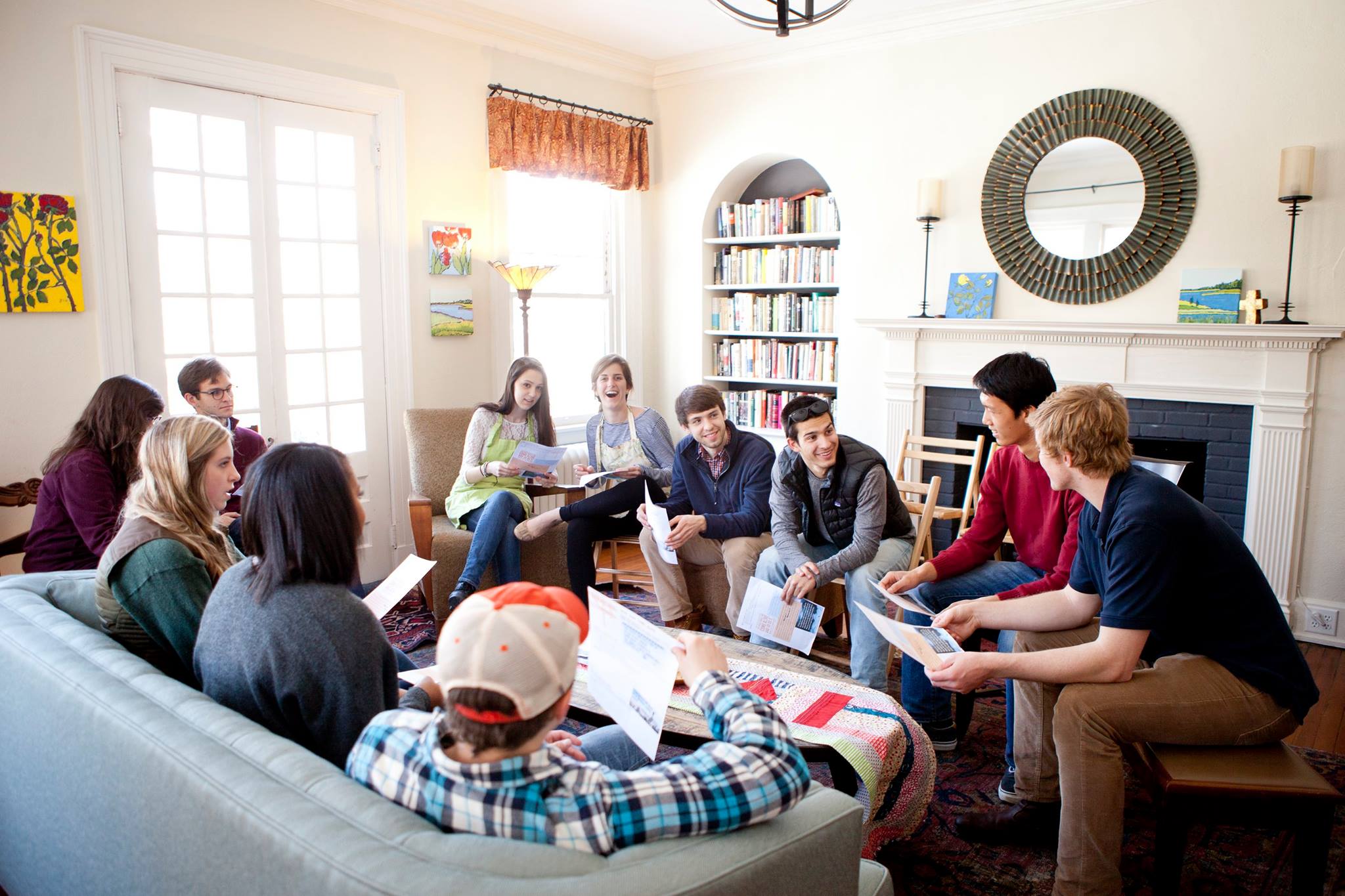 It’s pretty undeniable—the Bonhoeffer House is a cool place to be around. Throughout the end of my undergrad career, I fell in love with the way that Theological Horizons bridges the gap between the academy and faith communities that surround the University. I was looking for a place that I could come to with my faith tradition and ask questions and be skeptical. The Bonhoeffer House became that sacred space for me.
It’s pretty undeniable—the Bonhoeffer House is a cool place to be around. Throughout the end of my undergrad career, I fell in love with the way that Theological Horizons bridges the gap between the academy and faith communities that surround the University. I was looking for a place that I could come to with my faith tradition and ask questions and be skeptical. The Bonhoeffer House became that sacred space for me.
I knew I wanted to become a Fellow, so that I could go backstage and meet the band of the faithful who helped shape the Bonhoeffer House community. As a Fellow, I’ve had the opportunity to be paired with a mentor, develop friendships with other Fellows, and see what goes on behind-the-scenes (because despite how compelling the theory of spontaneous generation is, the snacks don’t just magically appear!)
First, I was paired with a mentor. Enter the lovely Kendall Cox: feminist theologian, university adjunct, and New City Arts artist! Kendall and I have shared incredible afternoons sipping Matcha tea (think antioxidants + fighting cancer + boosting metabolism all in one tasty cup!) and discussing the empowerment of marginalized groups like women in the church. I’m really thankful for the way that I was paired with a mentor who wrestles with the same types of questions as me.
I’ve also gotten to join in dinner discussions with all the Fellows. Once a month we meet up, share a meal, and discuss Scripture together. It’s a great experience because we represent many different fellowships around Grounds. Throughout the year, we’ve gotten closer and formed friendships. We’ve come together to celebrate and pray for one another in big life endeavors, ranging from marathons to mission trips in North Korea. We’re definitely an ambitious bunch.
Finally, being a Fellow has enabled me to participate in the behind-the-scenes operations of the Bonhoeffer House. I literally met the band! In the fall, the Bonhoeffer House hosted a house concert with Lowland Hum, artists-in-residence in Charlottesville. I helped set up chairs and got to talk to singer-songwriters Lauren and Daniel about their vocation.
All in all, being a Fellow has given me the opportunity to fully become part of a community that thinks, prays, and serves together. It’s been a wonderful year!
 Kaylee Lucas is an M.S. Commerce student from Richmond, VA. She studied Religious Studies in my undergraduate career at UVA and spent a lot of time at the Bonhoeffer House. Last summer, she traveled to Kenya and worked at a microfinance loan hub. Kaylee hopes to integrate a concern for human flourishing with her practical business skills from the Comm school.
Kaylee Lucas is an M.S. Commerce student from Richmond, VA. She studied Religious Studies in my undergraduate career at UVA and spent a lot of time at the Bonhoeffer House. Last summer, she traveled to Kenya and worked at a microfinance loan hub. Kaylee hopes to integrate a concern for human flourishing with her practical business skills from the Comm school.
Personal Finance Made Simple - A Flash Seminar With Karen Bonding, CFA Before you Graduate!
Get the basics of personal finance in this one hour flash seminar with UVA Commerce School professor Karin Bonding. Most people shy away from financial literacy, but it is not nearly as complicated as you think!
Karin Bonding formerly taught finance in UVa's McIntire School of Commerce. Ms. Bonding has worked as an investment professional in the areas of investment consulting, investment analysis, portfolio management, large pension funds, and marketing of investment services. She has organized investment conferences, developed short and long courses for novices and industry professionals, and conducted investment workshops at a variety of corporations. She was a Visiting Professor at the China Europe International Business School in Shanghai, China. She now focuses mainly on personal finance areas such as planning and advisory work and serves on the boards of directors of The Endowment Fund, Salient Alternative Strategies Fund, and other Salient Partners closed-end and open-end mutual funds.
Where Are You going? - A Reflection on the Fellows Program by Keith Wilson
 Fourth-year of college brings quite the interesting series of dilemmas. We seek jobs, degrees, friends, companions, roommates, apartments, and of course, the perfect ending to a college experience. What many fourth-years may not consider is who might be seeking us. What is God seeking for us as we depart from our undergraduate lives? Our tender, early-twenties hearts ache for a clear calling. Through my experience with Theological Horizon’s Fellows program, I lent my ear to God and learned to eagerly and patiently await my calling - my vocation.
Fourth-year of college brings quite the interesting series of dilemmas. We seek jobs, degrees, friends, companions, roommates, apartments, and of course, the perfect ending to a college experience. What many fourth-years may not consider is who might be seeking us. What is God seeking for us as we depart from our undergraduate lives? Our tender, early-twenties hearts ache for a clear calling. Through my experience with Theological Horizon’s Fellows program, I lent my ear to God and learned to eagerly and patiently await my calling - my vocation.
Throughout the program I was struck by many little kernels of wisdom from the great leaders that surround the Theological Horizons community.
The Lord sent a true messenger in my mentor, Evan Hansen. Over coffee, Evan spoke of his life, his vocation, and his love for his wife and his dearest daughter. Evan’s message to me was simple, direct, and so impactful. “Relax”. Evan taught me to take time to breathe and enjoy the splendor of a life filled with The Lord’s love.
The fellows program brought another great leader in Michael Guthrie. Michael showed us the true face of Jesus through a study of His parables. Michael’s kernel was one that I will carry with me for many years to come. “As much as the Lord demands to be the center of your life, you must also personally command his one and true place.” Michael brought this axiom into my life through the parable of the sower in the field. Just as the sower “sold it all”, I must remember that everything is “sold” to put God at the center of my life.
I most especially want to recognize the leadership and love shown by the program director Christy Yates. Christy, given that she appears the age of most my colleagues, has such a way of relating to a cohort of college kids better than any other leader I have ever been around. However, seeing here with her four children around, she possesses such a gift for showing tenderness, warmth, and affection of or befitting a mother. Christy’s kernel of knowledge wasn't anything she said, it was something she showed time and time again. The purest form of love is servant love. In John 13:34, Jesus gives His disciples a new order or command: "A new commandment I give you, that you love one another, even as I have loved you, that you also love one another.” This statement follows Jesus' washing of the disciples' feet on the occasion of the Last Supper. In washing their feet, Jesus gave the disciples tangible evidence of what love was like. The Greek word that is used here for love is agapao. In the Greek, this verb "to love" is present, active, and imperative. Agape is pure in the heart of Christy.
Beyond the time to talk and to pray with one another, Horizon Fellows required us to read intentionally on vocation and to seek a personal mission statement. My statement, after much contemplation is as follows. “Forever clinging to God’s grace and the fruit of the Spirit, I want other’s to feel, genuinely experience and believe that they matter to me, so that they may truly know that they matter to God and to the creation of His Kingdom.” I pray that God will grant me the faith-based adroitness, spiritual humility and invigorating zeal to fulfill this mission. I know that Horizon Fellows had cleared the path and will guide me as I leave UVA this May.
Join me in prayer as the program chooses it members for next year. To all such members, dive in and enjoy!
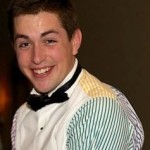 Keith Wilson is a fourth-year student from Louisville Kentucky and is studying Leadership and Public Policy at the Batten School. Keith's hobbies range from singing with his a cappella group, brewing a nice pot of tea, playing squash, and artisanal sandwich making/eating. It is his goal to one day own an upscale gas station/convenience store and teach at his alma mater, Trinity High School in Louisville, Kentucky.
Keith Wilson is a fourth-year student from Louisville Kentucky and is studying Leadership and Public Policy at the Batten School. Keith's hobbies range from singing with his a cappella group, brewing a nice pot of tea, playing squash, and artisanal sandwich making/eating. It is his goal to one day own an upscale gas station/convenience store and teach at his alma mater, Trinity High School in Louisville, Kentucky.
An exclusive interview with Philip Yancey: the spiritual lives of students
 In an audio interview from the Grounds of the University of Virginia, renowned Christian author Philip Yancey reflects on what it means to be a Christian in college. What are the challenges that university students face? Does faith make any difference? Don't miss Yancey's conversation with Karen Wright Marsh, executive director of Theological Horizons. To listen, click here.
In an audio interview from the Grounds of the University of Virginia, renowned Christian author Philip Yancey reflects on what it means to be a Christian in college. What are the challenges that university students face? Does faith make any difference? Don't miss Yancey's conversation with Karen Wright Marsh, executive director of Theological Horizons. To listen, click here.
Hospitality & Reconciliation - A Reflection on the Fellows Retreat by Jewel Crosswell
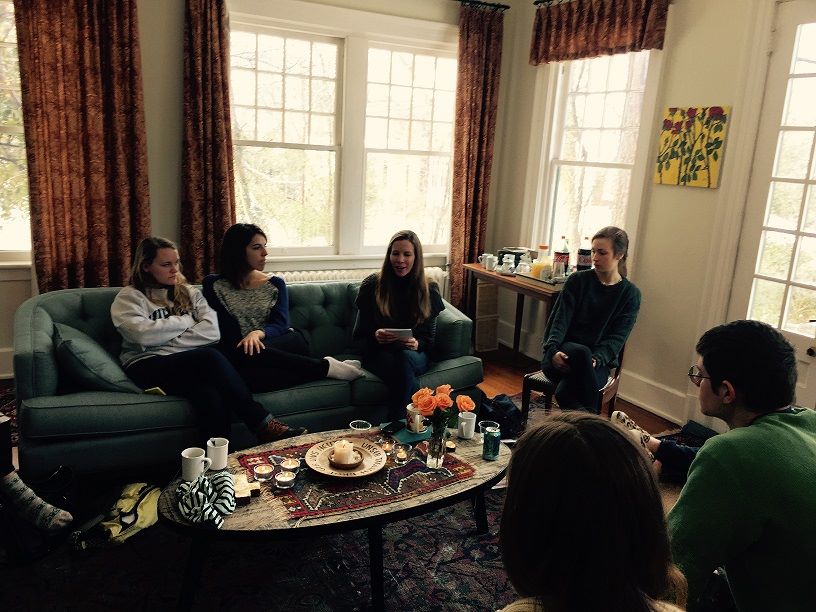 As I reflect on the fellows retreat, the concept of hospitality consistently comes to mind.
As I reflect on the fellows retreat, the concept of hospitality consistently comes to mind.
The retreat began on an off-note because of the massive snowstorm, resulting in us being unable to go to the intended retreat center in the beautiful mountains of Virginia. At that moment, the hospitality theme began. We were quickly welcomed into the home of Common Grounds for the entire afternoon and evening to cook, watch movies, and discuss what it means to live life together. The next day, we were warmly welcomed into Karen’s home to have our own Church service and break bread together. It truly was an incredibly tangible experience of hospitality at its finest on the most literal level.
On each of those days, we unpacked the idea of loving our neighbors and the way that might look in each one of our lives. We asked questions: What does it mean to live a life of love if we are working at a consulting firm? Can we possibly be doing God’s work if we aren’t in explicit ministry capacities? Can you make money and still love God? How do we choose our jobs based on the community as opposed to the job description? Is that something everyone should do? To what degree should we enter discomfort in our lives after college? What is the value of confession to other believers? What does it mean for us that God really meant it when He said, “It is finished” on the Cross? What does it even look like to love your neighbors?
I would like to focus on the final one, loving our neighbors. What a foreign concept in this “look out for number one” culture! But, if I did not know before what loving our neighbors looked like, I really saw it in action in the way each fellow listened to the other articulate his or her thoughts on vocation and calling, and the ultimate call to love everyone as Christ loves us. I really saw it in each person in describing his or her authentic, passionate, relentless desire to seek God’s Will and live a life of love. For some, it looks like entering college ministry. For others, it looks like being a dentist. And others, the corporate world. The list obviously goes on, but the common thread was absolutely clear; each person, in response to his or her call, aims to bring reconciliation across the divisive boundaries created by the world today.
This reconciliation will take many forms, but the point is each of us adamantly seeks redemptive relationships while here on earth so as to see the diversity of this world no longer seen as divisive, but rather unifying, the way Christ intended it to be in the beginning. Some of us will take to the streets to protest racial inequality, others will faithfully tend to their patients day in and day out, others will produce literature that forces our society to think about who and whose we are, others will work to create systemic change in our government to prevent human rights abuses, and still more will create music to remind us that beauty exists in the midst of brokenness. In all of these things, we see people being reconciled to each other and ultimately to their Creator as we realize redemption is real, and we are invited to participate in it.
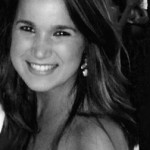 Jewel Crosswell is a fourth year majoring in Global Development Studies and Religious Studies. She is the co-editor of a weekly newsletter and participates in a local anti-trafficking initiative called the Charlottesville Justice Initiative. This past summer, she interned at International Justice Mission, an international human right agency dedicated to protecting the poor from violence. She loves to travel, run, hike, read, and spend time with friends
Jewel Crosswell is a fourth year majoring in Global Development Studies and Religious Studies. She is the co-editor of a weekly newsletter and participates in a local anti-trafficking initiative called the Charlottesville Justice Initiative. This past summer, she interned at International Justice Mission, an international human right agency dedicated to protecting the poor from violence. She loves to travel, run, hike, read, and spend time with friends
2015 Goodwin Prize competition for graduate students!
 Through the three annual Goodwin Prizes, with stipends of $2,500, $1,000 and $500, we recognize and reward the most promising graduate theology students in the world. The professor of the $2,500 prize winner receives $500. Visit the Goodwin Prize website page. There you will see submission guidelines, the authors and abstracts of past winning essays and find details on how to submit an essay.
Through the three annual Goodwin Prizes, with stipends of $2,500, $1,000 and $500, we recognize and reward the most promising graduate theology students in the world. The professor of the $2,500 prize winner receives $500. Visit the Goodwin Prize website page. There you will see submission guidelines, the authors and abstracts of past winning essays and find details on how to submit an essay.
The Louise and Richard Goodwin Writing Prizes for Excellence in Theological Writing are given to graduate students in recognition of essays that demonstrate:
- creative theological thinking,
- excellence in scholarship,
- faithful witness to the Christian tradition, and
- engagement with the community of faith.
Submissions are due June 1, 2015 via both email (goodwinprize@
For more information, or to receive more postcards or posters to publicize at your institution, email us at goodwinprize@theologicalhorizons.org.
"Where Do We Go From Here?" - A Reflection On Race & Mutuality by Carly Misenheimer
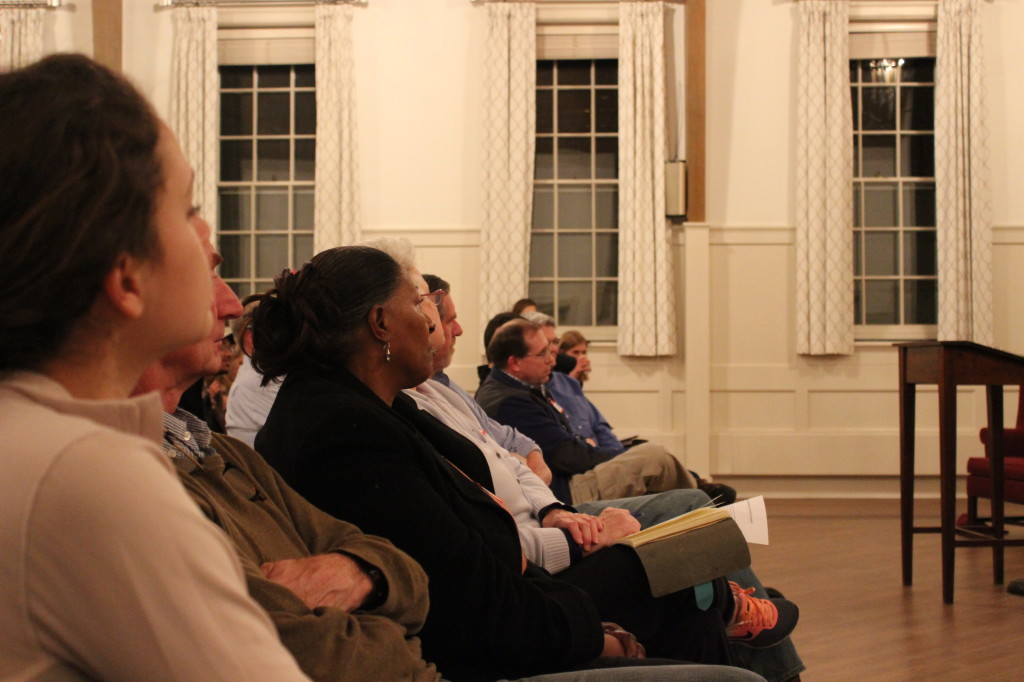 On a Friday afternoon this past summer, my friend and I took a leisurely walk through the neighborhoods behind West Main Street. We wove through the streets, picking out houses with colorful doors and imagining what raising a family in this neighborhood would be like. As we were walking, we approached an African American woman standing in the middle of the street, staring intently at a vacant house overgrown with weeds and vines. She struck up a conversation, explaining to us that this was her home in the 1960s. She recalled the games that her siblings played in the backyard and pointed out all of the things that had and had not changed about the property. She then explained the story of her eviction—how her family was uprooted from this home and sent to live in a new housing development. We walked with her through rows of houses hearing the stories of the families who once inhabited them. As we dropped her off at her current home, just streets over, the Spirit prompted us to hold hands and pray together. We embraced and went our separate ways, my friend and I recapping the conversation and discussing how moving this woman’s story had been. It was not until last week’s panel discussion, “Where Do we go from Here? Race and Mutuality in the Wake of Ferguson,” that I realized what a significant encounter this had been for both parties.
On a Friday afternoon this past summer, my friend and I took a leisurely walk through the neighborhoods behind West Main Street. We wove through the streets, picking out houses with colorful doors and imagining what raising a family in this neighborhood would be like. As we were walking, we approached an African American woman standing in the middle of the street, staring intently at a vacant house overgrown with weeds and vines. She struck up a conversation, explaining to us that this was her home in the 1960s. She recalled the games that her siblings played in the backyard and pointed out all of the things that had and had not changed about the property. She then explained the story of her eviction—how her family was uprooted from this home and sent to live in a new housing development. We walked with her through rows of houses hearing the stories of the families who once inhabited them. As we dropped her off at her current home, just streets over, the Spirit prompted us to hold hands and pray together. We embraced and went our separate ways, my friend and I recapping the conversation and discussing how moving this woman’s story had been. It was not until last week’s panel discussion, “Where Do we go from Here? Race and Mutuality in the Wake of Ferguson,” that I realized what a significant encounter this had been for both parties.
Last Thursday night, Theological Horizons hosted a panel discussion on Race and Mutuality at Westminster Presbyterian Church. The room was filled with people from different generations—college students, young professionals, and retirees. While most of the attendants were white, it seemed that everyone in the room was eager to learn about how they should live with grace and responsibility toward their neighbors following the events at Ferguson.
During the Q and A period, an elderly African American man rose to mention the effects of “Vinegar Hill” on race relations in Charlottesville. Chief Timothy Longo responded to this man’s claim, stating that the law enforcement in Charlottesville is working to educate its members on the city’s racial history in hopes of bettering relations within the community today. Chief Longo spoke on the problem of broken trust, and the solution that may be found in a community in which trust is regained. Meanwhile, I was nudging the person next to me asking her, “What is Vinegar Hill?”
Second year student and panelist, Aryn Frazier, made note that nothing in society happens in a vacuum. Like Longo said, race relations in Charlottesville are rooted in a history of broken trust and frayed relationships. It is important that we know the context of the racial situation in which we are living so that we may act appropriately and responsibly. I came home from the panel and began researching the story of “Vinegar Hill.” I found that this was the name given to the gentrification project of the 1960s that my summer friend had described to me in vivid detail. Had I missed this opportunity to stop and hear her story, I would never know so intimately what this broken situation entailed. And she may have never known that there are 21-year-old white girls who are eager to listen.
As we move forward in the community of Charlottesville following the events that happened in a neighborhood not unlike our own, it is important that we stop to hear the stories of those who are different from us. Thursday’s meeting on Race and Mutuality was a beautiful beginning to an ongoing conversation; and I pray that it will develop into a dialogue that outgrows its predominately white, middle-class group of attendants. Panelist Tracy Howe Wispelwey left us with the question, “Do we belong to one another?” As we move forward in hopes of reconciliation and peace, our community must learn what it means to belong to one another—to carry the burdens of the neighbors we do not yet know. This responsibility rests on people from all neighborhoods—from student dorms on McCormick to the houses on Prospect. In order to live in mutuality, we must take the risk of knowing and being known. Only then may we write for our community a better story.
The Story of Vinegar Hill neighborhood of Charlottesville narrated by Mr. John Gaines and Ms. Ann Carter:
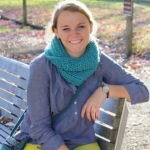 Carly Misenheimer is a fourth year from High Point, North Carolina. She is a Religious Studies Major, and she is writing her Distinguished Majors Thesis on the language of naming God in Feminist Theology. She hopes to attend Divinity School after graduation. She leads Young Life College at UVA, and she enjoys singing, hiking the Blue Ridge Mountains, Cheerwine and spontaneity.
Carly Misenheimer is a fourth year from High Point, North Carolina. She is a Religious Studies Major, and she is writing her Distinguished Majors Thesis on the language of naming God in Feminist Theology. She hopes to attend Divinity School after graduation. She leads Young Life College at UVA, and she enjoys singing, hiking the Blue Ridge Mountains, Cheerwine and spontaneity.
Where do we go from here? Race & Mutuality in the Wake of Ferguson
Thursday, January 29th, 7:30pm | Common Grounds | 480 Rugby Road
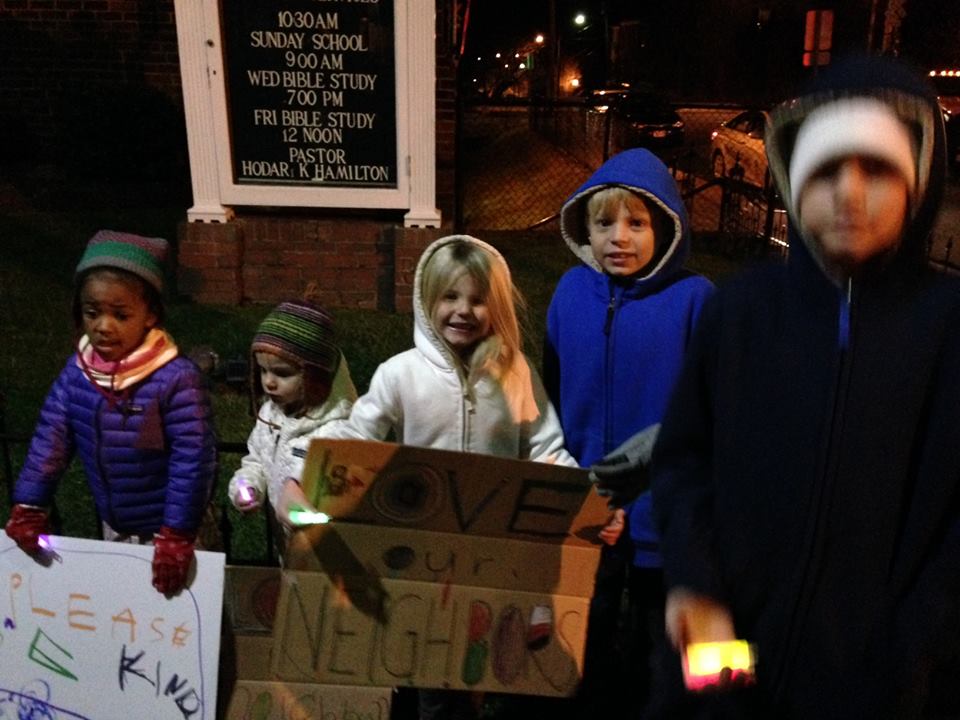
In an effort to look with honesty at race relations within our University and surrounding community, we’ve asked a diverse panel to consider: 1)What is our responsibility toward one another in the wake of Ferguson events? 2) How might that look practically in the context of Charlottesville and at UVa?
The panelists include:
• Ms. Aryn Frazier, UVa student, Jefferson Scholar, Political Action Chair of the Black Student Alliance
• Dr. Patrice Grimes, Associate Dean, Office of African-American Affairs
• Dr. John Inazu, Associate Professor of Law & Political Science, Washington University, St. Louis, MO
• Chief Tim Longo, Charlottesville Police Department
• Ms. Tracy Howe Wispelwey, Director of University Ministries, Westminster Presbyterian Church
With Dr. Maurice Apprey, Dean, Office of African-American Affairs, UVa as Moderator
Common Grounds is the white house on the corner of Rugby Rd. and Gordon Ave. Free parking available at Westminster Presbyterian Church, Gordon Ave. and the UVA Culbreth Theater.
Beat the Rush: resources for students during sorority rush
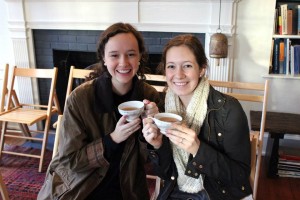 Sorority rush begins at UVa this week--a process that sparks many urgent questions: Who are my friends? Where do I find my identity? Am I beautiful? How do I deal with stress and disappointment? with judgement? Where is God in all of this? These are questions that we all ask throughout our lives!
Sorority rush begins at UVa this week--a process that sparks many urgent questions: Who are my friends? Where do I find my identity? Am I beautiful? How do I deal with stress and disappointment? with judgement? Where is God in all of this? These are questions that we all ask throughout our lives!
Culture-Making - A Response By Emilia Gore
Culture-making World’s waking A restlessness overwhelms The watchfulness That’s needed Heed seeds sown In patience And gratitude
--Emilia Gore
We all make culture. The question isn’t whether or not you’ll engage in culture-making, the question is what kind of culture you’ll produce and promote. Members of Charlottesville’s community heard Tim Keller speak these words at a national event, Q Commons, on a Thursday evening in October.
Recently, UVA culture has attracted national media attention. No headline or University response can fully capture our University’s nuanced culture. Still, as I read the articles, my heart sank. What kind of culture have we created? As I searched for an answer through discussions in class and conversations among friends, I felt both hopeful and discouraged. Some friends attacked our University culture and others defended it; but more importantly, the majority of us forgot about our collective ability to shape it.
Students left for thanksgiving break with heavy hearts and heated heads. Unrest still marks the grounds as we return from our gratitude-centered holiday. Conversations in the dorm revolve around the stress of finals and a readiness to return home. Currently, we foster a culture of comparing and complaining. Personally, I want to move our culture toward one of gratitude and thankfulness. It goes beyond not complaining; it’s “more than a mental exercise, more than a formula of words. We cannot be satisfied to make a mental note of things which God has done for us and then perfunctorily thank Him for favors received. To be grateful is to recognize the love of God in everything He has given us—and He has given us everything.” (Thomas Merton, Vintage Week 12) This advent season, what would happen to our culture if we sought to see God in everything he has given us?
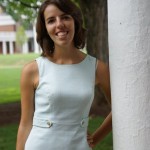 Emilia Gore is a 4th year Political and Social Thought major from Washington, DC. Some of her interests include Mandarin, sustainable agriculture, ethics, and Cuban history. This year, Emilia will lead a Food and Agriculture Organization committee at UVA's Model United Nations and continue to manage the UVA Community Garden.
Emilia Gore is a 4th year Political and Social Thought major from Washington, DC. Some of her interests include Mandarin, sustainable agriculture, ethics, and Cuban history. This year, Emilia will lead a Food and Agriculture Organization committee at UVA's Model United Nations and continue to manage the UVA Community Garden.
The Ethics Of Eating? - Salon Evening with Willis Jenkins - THIS THURSDAY
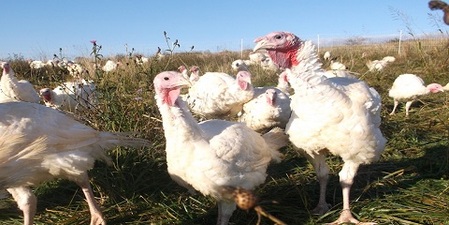
A salon evening with Willis Jenkins on The Ethics of Eating?
Thursday, December 4th | Doors open at 7pm.
Talk will begin around 7:45pm.
Common Grounds (480 Rugby Rd. parking behind Common Grounds and at Westminster Presbyterian).
With special guest: Jesse Straight of Whiffletree Farm
And a pop-up holiday market!
Brought to you by Theological Horizons in partnership with the Project on Lived Theology
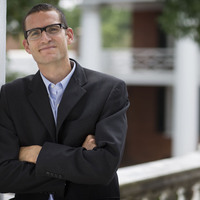
Willis Jenkins is Associate Professor of Religion, Ethics, and Environment at UVa and the author of two award-winning books, Ecologies of Grace: Environmental Ethics & Christian Theology, which won a 2009 Templeton Award for Theological Promise, and The Future of Ethics: Sustainability, Social Justice, and Religious Creativity, which won an American Academy of Religion Award for Excellence. He’s from a Virginia farming family
A Hospitable Space for New Viewpoints - Christy Yates on the Thursday Evening Salons
I had the privilege of interviewing our Associate Director, Christy Yates, who facilitates our monthly Thursday Evening Salons. Each Salon takes a slightly different shape and I hope you enjoy hearing Christy's vision behind the series. Our next Salon will be December 4 at 7:30pm featuring Dr. Willis Jenkins on food ethics. Hope you join us!
- Anna Elliott
____________________________________________________________________
Anna: Could you briefly introduce yourself?
Christy: My family just moved to Charlottesville this past summer. For the 8 years prior to moving here, I worked with college students through service-learning and community engagement. I believe strongly that our faith and sense of vocation develop best when we're exposed to differing viewpoints and serving in the 'real world'. Staying in the college bubble, especially with students just like us, is much more comfortable, but usually reinforces our own point of view. Pulling students out of that bubble is, to me, one of the most exciting journeys to take. I am also mom to four crazy kids, wife to a philosopher and writer, as well as a painter (www.christenyates.com) which is one of the ways I get to work out my own reflections on what it means to be human.
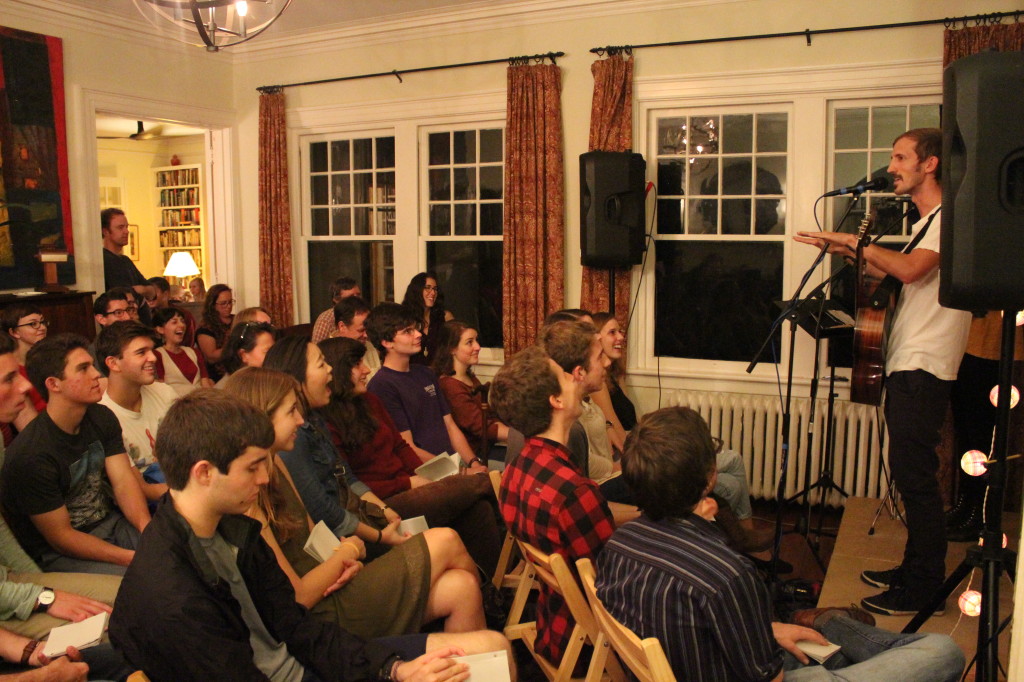
Anna: What is your vision for the Thursday Evening Salons at the Bonhoeffer House?
Christy: Theological Horizons has a history of offering academics, artists and activists to share their thoughts on life and faith. What I love about these events is that they happen in the warmth and generous hospitality of a home with student, faculty and community members all present. The lines between these divisions get blurred. It's a safe place to ask questions and hear viewpoints that you might not normally hear in the classroom or even in a church or community setting. In that sense, it reminds me of my family dinner table, growing up with a seminary professor as a dad and various friends and students often present. From universalism to gender and sexuality issues to money and social justice to the arts and food ethics....everything is open to discussion!
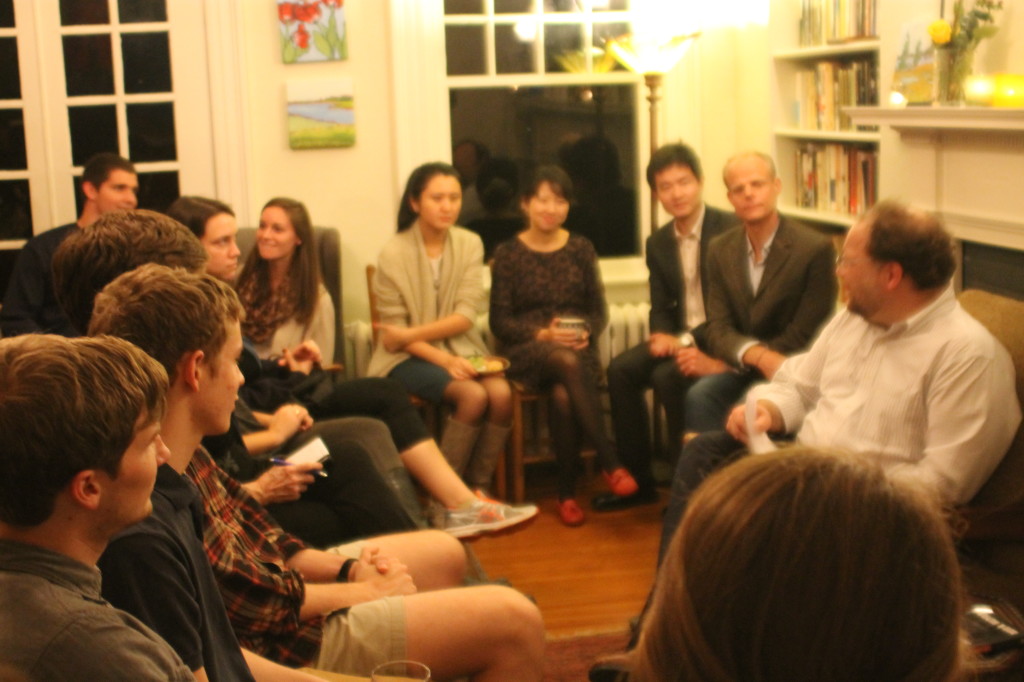
Anna: What do you hope attendees will take away from a Salon?
Christy: My hopes for these monthly events are that people would experience the wonderful risk of looking at issues from another person's point of view, that they would meet folks they wouldn't normally meet, that they would have an invitation to step into new habits of being, and that, above all, they'd experience the radical hospitality and grace of God through a faithful and loving community.
Anna: Could you tell us a little about the upcoming Salon with Willis Jenkins?
Christy: We're really excited to host Willis who comes to us from Yale University. He grew up on a farm near here and did his doctorate studies at UVa and I just learned he won the 2014 American Academy of Religion Award for Excellence for his book "The Future of Ethics: Sustainability, Social Justice, and Religious Creativity (Georgetown University Press, 2013) He'll be talking about the ethics of food and we're also excited to have a local farmer - Jesse Straight of Whiffletree Farm who happened to have Willis as a TA in undergrad at UVa - come and share about his work. Finally, we're hoping to have a few other local producers selling their goods whether it's food related or arts and craft. This will be a great opportunity to practice the implications of what Willis talks about and shop more ethically for the holidays. It'll be fun!








